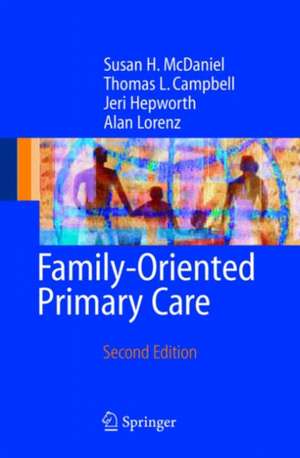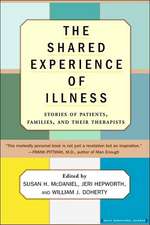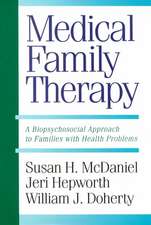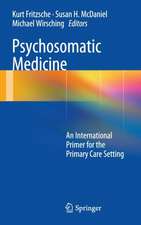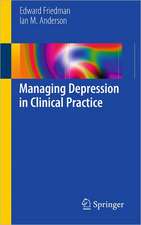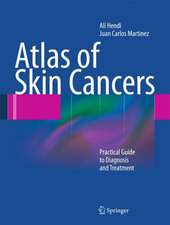Family-Oriented Primary Care
Autor Susan H. McDaniel Cuvânt înainte de D. Satcher Autor Thomas L. Campbell, Jeri Hepworth, Alan Lorenzen Limba Engleză Paperback – 27 aug 2004
Preț: 1036.44 lei
Preț vechi: 1090.99 lei
-5% Nou
Puncte Express: 1555
Preț estimativ în valută:
198.32€ • 207.65$ • 164.50£
198.32€ • 207.65$ • 164.50£
Carte tipărită la comandă
Livrare economică 09-23 aprilie
Preluare comenzi: 021 569.72.76
Specificații
ISBN-13: 9780387986142
ISBN-10: 0387986146
Pagini: 484
Ilustrații: XX, 484 p. 26 illus.
Dimensiuni: 155 x 235 x 23 mm
Greutate: 0.7 kg
Ediția:2nd ed. 2005
Editura: Springer
Colecția Springer
Locul publicării:New York, NY, United States
ISBN-10: 0387986146
Pagini: 484
Ilustrații: XX, 484 p. 26 illus.
Dimensiuni: 155 x 235 x 23 mm
Greutate: 0.7 kg
Ediția:2nd ed. 2005
Editura: Springer
Colecția Springer
Locul publicării:New York, NY, United States
Public țintă
Professional/practitionerDescriere
I was a Medical Student in 1966 when the Millis Report on the training of the generalist physician was published,de?ning the concept of primary care. According to the Report, the primary provider has four major responsib- ities or roles. The ?rst role is that of initial contact care of the undiffer- tiated patient. The second is to provide comprehensive care based on the belief that the primary provider should be able to manage the overwhe- ing majority of problems with which patients present. Equally important is the third role—continuity and coordination of care within the health care system. Finally,the primary provider is responsible for demonstrating le- ership in the community. This Report’s description of a primary provider seems as relevant today as it was when it was written. In 1994,the Institute of Medicine’s assessment of primary care added the responsibility of family and community integration of care to the Millis Report description. Without question there are many challenges to a contemporary imp- mentation of this comprehensive description of primary care, beginning with the level of individual patients who so often suffer from complex pr- lems, such as mental disorders and obesity. Treating these conditions in a brief primary care visit is dif?cult. At the level of the larger system, re- bursement is often inadequate and can represent policies that are uns- portive of primary care, such as those that compromise payment for preventive services that help patients to quit smoking or lose weight.
Cuprins
Preface to the Second Edition.- Preface to the First Edition.- Chapter 1. Basic Premises of Family-Oriented Primary Care: Collaborating with the Family to Improve Quality of Care.- Chapter 2. How Families Affect Illness: Research on the Family's Influence on Health.- Chapter 3. Family Systems Concepts: Tools for Assessing Families in Primary Care.- Chapter 4. A Family-Oriented Approach to Individual Patients.- Chapter 5. Involving the Family in Daily Practice.- Chapter 6. Building Partnerships: Promoting Working Alliances and Motivation for Change.- Chapter 7. Family Interviewing Skills in Primary Care: From Routine Contact to the Comprehensive Family Conference.- Chapter 8. When Interactions Are Difficult.- Chapter 9. Working with Couples in Primary Care: One Plus One Is More Than Two.- Chapter 10. The Birth of a Family: Family-Oriented Pregnancy Care.- Chapter 11. Supporting Parents: Family-Oriented Child Health Care.- Chapter 12. When Parents Get Stuck: Helping With Child Behavior Problems.- Chapter 13. Family-Oriented Care of Adolescents.- Chapter 14. Recognizing the Signs of Strain: Counseling Couples in Primary Care.- Chapter 15. Anticipating Loss: Health Care for Older Patients and Their Family Caregivers.- Chapter 16. Looking Death in the Eye: Facilitating End-of-Life Care and the Grieving Process.- Chapter 17. Genetic Screening, Testing, and Families.- Chapter 18. The Developmental Challenges of Chronic Illness: Helping Patients and Families Cope.- Chapter 19. Integrating the Mind-Body Split: A Biopsychosocial Approach to Somatic Fixation.- Chapter 20. Mobilizing Resources: The Assessment and Treatment of Depression in Primary Care.- Chapter 21. When Drinking or Drugs Is Part of the Problem: A Family Approach to the Detection and Management of Substance Use and Abuse.- Chapter 22. Protecting the Family: Domestic Violence and the Primary Care Clinician.- Chapter 23. Family-Oriented Primary Care in the Real World: Practical Considerations for Comprehensive Care.- Chapter 24. Acute Hospital Care: Letting the Family In.- Chapter 25. Working Together: Collaboration and Referral to Family-Oriented Mental Health Professionals.- Chapter 26. Managing Personal and Professional Boundaries: How the Clinician's Experience Can Be a Resource in Patient Care.
Recenzii
"[This book]fills an important void in our education and therefore is highly recommended. I wish it every success because if it succeeds, we all win."
-Jack H. Medalie, M.D., M.P.H. F.A.A.F.P, Case Western Reserve University School of Medicine
Advance praise for Family-Oriented Primary Care: A Manual for Medical Providers:
"A superb job. I'm eager to recommend it to all medical students and family practice residents."
- Eugene S.Farley, Jr., University of Wisconsin Medical School
From the reviews of the second edition:
"A comprehensive approach to the education and training of primary care physicians and other primary care providers … . The book is organized so that each chapter has a discreet goal. … the authors are to be highly commended for writing and then updating a thoughtful and comprehensive book. This volume is replete with references that provide additional resources and ideas … . an excellent addition to any family medicine training program … an important resource for primary care physicians and psychologists … ." (Ronald B. Margolis, PsycCRITIQUES online, April, 2005)
-Jack H. Medalie, M.D., M.P.H. F.A.A.F.P, Case Western Reserve University School of Medicine
Advance praise for Family-Oriented Primary Care: A Manual for Medical Providers:
"A superb job. I'm eager to recommend it to all medical students and family practice residents."
- Eugene S.Farley, Jr., University of Wisconsin Medical School
From the reviews of the second edition:
"A comprehensive approach to the education and training of primary care physicians and other primary care providers … . The book is organized so that each chapter has a discreet goal. … the authors are to be highly commended for writing and then updating a thoughtful and comprehensive book. This volume is replete with references that provide additional resources and ideas … . an excellent addition to any family medicine training program … an important resource for primary care physicians and psychologists … ." (Ronald B. Margolis, PsycCRITIQUES online, April, 2005)
Caracteristici
Includes supplementary material: sn.pub/extras
